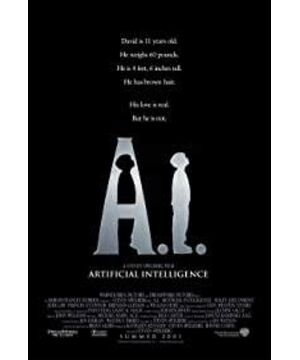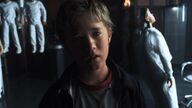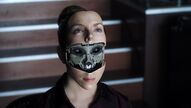Pure white loose T-shirt, soft hair, beautiful smile. Pacing around the room, turning around and saying: I like your floors.
This is David's first appearance in the movie.
Such a child is so dear. However, he is a robot kid, an artificial intelligence composed of millions of optical fibers.
Spielberg's work has been known for a long time. I watched it recently on my computer at home. The film has very typical movie elements - very unique elements belonging to Spielberg: science fiction, human nature, children, love, eternity... It's
like a beautiful fairy tale, but also a cruel fable.
The plot of the film gave me the feeling that David was never really loved by Marika. Marika simply uses David as a substitute for Mark (Marika's son). And when Mark recovered, David lost his value in Marika's heart.
And in David's perception, the love for Marika has already been burned into his hard drive along with the series of characters. Therefore, he persistently, sincerely and without regrets loves his "Mummy" Marika. This kind of love is given by Marika's instructions, more like an irreversible procedure.
After being abandoned by Marika, David began to look for the blue fairy in the fairy tale who could turn the puppet into a child, hoping that the blue fairy could also turn himself into a real child. He thought that he would get Marika's love in this way.
In the film, artificial intelligences like David have been able to perceive their own existence as individuals, and strive to prove their uniqueness and the value of existence. At this level, his thinking is almost the same as that of a human being. In order to get Marika's love, he kept thinking, verifying, and even coming to a conclusion. The independence and logic of this kind of thinking is the difference between human thinking and intelligent programs. However, all of David's persistence and simplicity are endowed by the adoption initiation procedure carried out by Marika, which is a procedure in itself, more like a prerequisite procedure for all of David's subsequent actions.
Guided by this irreversible program and powerful and independent logical reasoning, David encountered an inextricable shackle. In the Manhattan office of the intelligent robot, he brutally smashed a robot child identical to himself, and then jumped into the ocean that flooded New York.
The existence of the human individual lies in its uniqueness. The essential difference between intelligent machines and human individuals discussed in the film may be a social and ethical issue that technological progress has to face. Being able to perceive one's own existence is a trend in the development of intelligence. And to perceive one's own existence, there must be a natural requirement for uniqueness. But if artificial intelligence is able to perceive its own existence, and all are unique individuals, then, does human beings still have the meaning of existence? Will it be replaced by intelligent machines with the same uniqueness, or will the two coexist? It can be imagined that it will be not far from the extinction of mankind.
This kind of grand topic is heavy, but it is the quality that a good movie should have. Spielberg is a master who loves the world infinitely. It is because of being full of love that I worry about losing, and worrying that prosperous technology will be the killer of the extinction of human society.
Just like David in the film, looking at the back of Marika who went to the party with Henry, he asked the teddy bear worriedly: Is fifty years long? He was worried about Marika's departure because he loved too much.
At the end of the film, in order to make David happy, the intelligent creatures two thousand years later revived Marika to live with David. But only one day. Because the time and space trajectory gives each person only one time, even if they can be resurrected, they can only exist for a short day and night. Perhaps this is Spielberg's interpretation of eternity: everything is beautiful, even if it can't last forever, a brief possession is enough to wait for two thousand years of long and persistent prayer.
"This is the eternal time he has been waiting for, but it is fleeting." The film ends with this narration. Marika had passed away again in silence, David held Marika's hand and smiled and burst into tears, and the teddy bear sat on the bed. The afterglow of the setting sun fills the room through the wide floor-to-ceiling windows. The lights gradually turned off.
As I write this, I keep recalling a scene from the film: Marika invites David to a picnic, and David is overjoyed. When he got to the jungle, David put the teddy bear on the tree trunk, and then he couldn't wait to lay out the tablecloth for picnic. Afterwards, Marika abandoned David in the dense forest. The rearview mirror of the distant car showed the outline of David. Her body was leaning and trembling because of grief and sobbing, and she looked extra weak.
I suddenly remembered a passage I read not long ago: So true feelings are ultimately irrelevant to everything grand. It has nothing to do with the deep and difficult religious philosophy. It has nothing to do with indestructible ethics. Nothing to do with the ever-changing world. (Annie Babe's "Sobering Period")
In human society, such persistent and sincere feelings may have disappeared. On the contrary, existence is more mechanical and procedural, and I can't help feeling sad.
If feelings are the most gorgeous existence of human beings, then perhaps everyone should be grateful for their ability to choose and give up. Random and illogical behavior is more a trait of the human mind than just programmed recklessness. However, this random and illogical behavior is the manifestation of morbidity in human society and is resisted and abandoned. But in front of the pure and persistent feelings, there is an indescribable eternity and yearning for life.
This is like a paradox. I can't figure it out.
PS: The artistic conception of two songs is quite similar to the two thousand years of vicissitudes in this movie.
One is "A Thousand Years Later" by JJ Lin, and the other is "A Thousand Centuries" by Mayday. All very favorite songs.
Spielberg's imagination is too rich. I want just that cute talking teddy bear too.
View more about A.I. Artificial Intelligence reviews











